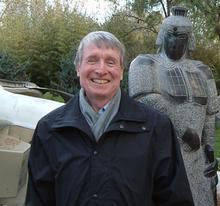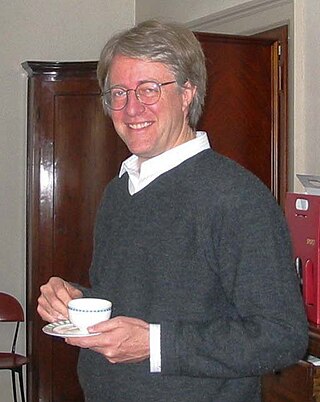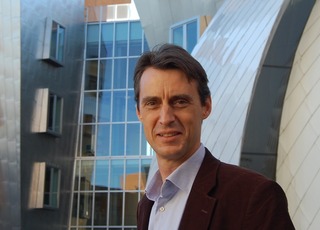Related Research Articles

The Santa Fe Institute (SFI) is an independent, nonprofit theoretical research institute located in Santa Fe, New Mexico, United States and dedicated to the multidisciplinary study of the fundamental principles of complex adaptive systems, including physical, computational, biological, and social systems. The institute is ranked 24th among the world's "Top Science and Technology Think Tanks" and 24th among the world's "Best Transdisciplinary Research Think Tanks" according to the 2020 edition of the Global Go To Think Tank Index Reports, published annually by the University of Pennsylvania.

John Henry Holland was an American scientist and Professor of psychology and Professor of electrical engineering and computer science at the University of Michigan, Ann Arbor. He was a pioneer in what became known as genetic algorithms.

Norman Harry Packard is a chaos theory physicist and one of the founders of the Prediction Company and ProtoLife. He is an alumnus of Reed College and the University of California, Santa Cruz. Packard is known for his contributions to chaos theory, complex systems, and artificial life. He coined the phrase "the edge of chaos".

Rebecca Newberger Goldstein is an American philosopher, novelist, and public intellectual. She has written ten books, both fiction and non-fiction. She holds a Ph.D. in philosophy of science from Princeton University, and is sometimes grouped with novelists such as Richard Powers and Alan Lightman, who create fiction that is knowledgeable of, and sympathetic toward, science.
Simon Asher Levin is an American ecologist and the James S. McDonnell Distinguished University Professor in Ecology and Evolutionary Biology and the director of the Center for BioComplexity at Princeton University. He specializes in using mathematical modeling and empirical studies in the understanding of macroscopic patterns of ecosystems and biological diversities.
David Pines was the founding director of the Institute for Complex Adaptive Matter (ICAM) and the International Institute for Complex Adaptive Matter (I2CAM), distinguished professor of physics, University of California, Davis, research professor of physics and professor emeritus of physics and electrical and computer engineering in the Center for Advanced Study, University of Illinois at Urbana–Champaign (UIUC), and a staff member in the office of the Materials, Physics, and Applications Division at the Los Alamos National Laboratory.
Joshua Morris Epstein is Professor of Epidemiology at the New York University College of Global Public Health. Formerly Professor of Emergency Medicine at Johns Hopkins University, with joint appointments in the departments of Applied Mathematics, Economics, Biostatistics, International Health, and Environmental Health Sciences and the Director of the JHU Center for Advanced Modeling in the Social, Behavioral, and Health Sciences. He is an External Professor at the Santa Fe Institute, a member of the New York Academy of Sciences, and a member of the Institute of Medicine's Committee on Identifying and Prioritizing New Preventive Vaccines.
Timothy F. H. Allen is a British botanist and former Professor of Botany and Environmental Studies at the University of Wisconsin–Madison. Allen is a leader in the fields of hierarchy theory, systems theory, and complexity.

Vincent Daniel Blondel is a Belgian professor of applied mathematics and current rector of the University of Louvain (UCLouvain) and a visiting professor at the Massachusetts Institute of Technology (MIT). Blondel's research lies in the area of mathematical control theory and theoretical computer science. He is mostly known for his contributions in computational complexity in control, multi-agent coordination and complex networks.
Scott E. Page is an American social scientist and John Seely Brown Distinguished University Professor of Complexity, Social Science, and Management at the University of Michigan, Ann Arbor, where he has been working since 2000. He has also been director of the Center for the Study of Complex Systems at the University of Michigan (2009–2014) and an external faculty member at the Santa Fe Institute.
James P. Crutchfield is an American mathematician and physicist. He received his B.A. summa cum laude in Physics and Mathematics from the University of California, Santa Cruz, in 1979 and his Ph.D. in Physics there in 1983. He is currently a Professor of Physics at the University of California, Davis, where he is Director of the Complexity Sciences Center—a new research and graduate program in complex systems. Prior to this, he was Research Professor at the Santa Fe Institute for many years, where he ran the Dynamics of Learning Group and SFI's Network Dynamics Program. From 1985 to 1997, he was a Research Physicist in the Physics Department at the University of California, Berkeley. He has been a Visiting Research Professor at the Sloan Center for Theoretical Neurobiology, University of California, San Francisco; a Post-doctoral Fellow of the Miller Institute for Basic Research in Science at UCB; a UCB Physics Department IBM Post-Doctoral Fellow in Condensed Matter Physics; a Distinguished Visiting Research Professor of the Beckman Institute at the University of Illinois, Urbana-Champaign; and a Bernard Osher Fellow at the San Francisco Exploratorium.
Marcus William Feldman is the Burnet C. and Mildred Finley Wohlford Professor of Biological Sciences, director of the Morrison Institute for Population and Resource Studies, and co-director of the Center for Computational, Evolutionary and Human Genomics (CEHG) at Stanford University. He is an Australian-born mathematician turned American theoretical biologist, best known for his mathematical evolutionary theory and computational studies in evolutionary biology, and for originating with L. L. Cavalli-Sforza the theory of cultural evolution.
David Hilton Wolpert is an American mathematician, physicist and computer scientist. He is a professor at Santa Fe Institute. He is the author of three books, three patents, over one hundred refereed papers, and has received numerous awards. His name is particularly associated with a group of theorems in computer science known as "no free lunch".

Luis M. Rocha is the George J. Klir Professor of Systems Science at the Thomas J. Watson College of Engineering and Applied Science, Binghamton University. He has been director of the NSF-NRT Complex Networks and Systems graduate Program in Informatics at Indiana University, Bloomington, USA. He is also director of the Center for Social and Biomedical Complexity, between Binghamton University and Indiana University, Bloomington, a Fulbright Scholar, and Principal Investigator at the Instituto Gulbenkian de Ciencia, Portugal. His research is on complex systems and networks, computational and systems biology, biomedical complexity and digital health, and computational intelligence.

J. Stephen Lansing is an American anthropologist and complexity scientist. He is especially known from his decades of research on the emergent properties of human-environmental interactions in Bali, Borneo and the Malay Archipelago; social-ecological modeling, and complex adaptive systems. He is an external professor at the Santa Fe Institute and the Complexity Science Hub Vienna; a Fellow at the Center for Advanced Study in the Behavioral Sciences at Stanford; a visiting scholar at the Hoffman Global Institute for Business and Society at INSEAD Singapore, and emeritus professor of anthropology at the University of Arizona.
Jean Marie Carlson is a Professor of Complexity at the University of California, Santa Barbara. She studies robustness and feedback in highly connected complex systems, which have applications in a variety of areas including earthquakes, wildfires and neuroscience.
Laura Fortunato is an evolutionary anthropologist whose research investigates the evolution of human social and cultural behavior. She investigates topics such as the evolution of kinship and marriage systems, social complexity and culture.
Jessica C. Flack is a data scientist, evolutionary biologist, and professor at the Santa Fe Institute.
Jin-Yi Cai is a Chinese American mathematician and computer scientist. He is a professor of computer science, and also the Steenbock Professor of Mathematical Sciences at the University of Wisconsin–Madison. His research is in theoretical computer science, especially computational complexity theory. In recent years he has concentrated on the classification of computational counting problems, especially counting graph homomorphisms, counting constraint satisfaction problems, and Holant problems as related to holographic algorithms.
C. Brandon Ogbunu(gafor) is an American computational biologist who is an Assistant Professor of Ecology and Evolutionary Biology at Yale University, and an External Professor at the Santa Fe Institute. He uses experimental and computational tools to understand the causes of disease, ranging from molecular underpinnings to the social determinants of public health. In addition, he runs a parallel research program at the intersection between science and culture, where he explores social forces craft science, and how sciences influences society.
References
- 1 2 WIRED. "The Smart List 2012: 50 people who will change the world". WIRED UK. Retrieved September 29, 2017.
- 1 2 3 4 5 "David Krakauer | Santa Fe Institute". www.santafe.edu. Retrieved September 29, 2017.
- ↑ John; Krakauer, David (August 7, 2017). "John1 and David2 Krakauer". Current Biology. 27 (15): R734–R737. doi: 10.1016/j.cub.2017.06.008 . ISSN 0960-9822.
- ↑ "Remaking the UW". Isthmus | Madison, Wisconsin. January 24, 2013. Retrieved September 29, 2017.
- 1 2 "DAVID_KRAKAUER". c4.santafe.edu. Retrieved September 29, 2017.